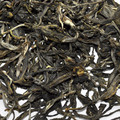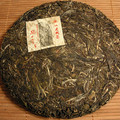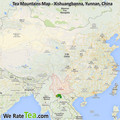Quotes - Tea oxidation
„hou fajiao; 后发酵 - Post-fermented. 后hou - behind, after. 发; fa - has many meanings; to develop, expand, bring into existences, start; rise or expand when fermented. 酵 jiao - fermented. Together 发酵 means to ferment. Confusion often arises as the term fajiao is used to refer to both processes of fermentation and oxidation. The more specific term yang hua - 氧化 refers specifically to oxidation.“

Quotes Tags: Tea oxidation, Tea production, China
„Poor control in fermentation/oxidation process can result in bad ripened pu'er, characterized by badly decomposed leaves and an aroma and texture reminiscent of compost.“
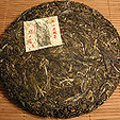
Quotes Tags: Pu-erh, Tea oxidation, Shu - Ripe Puerh
„Unlike green tea produced in china which is dried with hot air after the pan-frying stage to completely kill enzyme activity, leaves used in the production of pu-erh are only pan-fried and thus a small amount of enyzmes are left which contribute a minor amount of oxidation to the leaves during sun-drying“

Quotes Tags: Pu-erh, Tea oxidation
„The leaves are then dry pan-fried using a large wok in a process called "kill green" (殺青; pinyin: shā qīng), which arrests most enzyme activity in the leaf and prevents full oxidation. After pan-frying, the leaves are rolled, rubbed, and shaped into strands through several steps to lightly bruise the tea and then left to dry in the sun.“

Quotes Tags: Pu-erh, Tea oxidation
„Ripened or aged raw pu-erh has occasionally been mistakenly categorised as a subcategory of black tea due to the dark red colour of its leaves and liquor. However, pu-erh in both its ripened and aged forms has undergone secondary oxidization and fermentation caused both by organisms growing in the tea and free-radical oxidation, thus making it a unique type of tea. This divergence in production style not only makes the flavour and texture of pu-erh tea different but also results in a rather different chemical makeup to resulting brewed liquor.“

Quotes Tags: Pu-erh, Tea oxidation, Sheng - Raw Puerh, Shu - Ripe Puerh
„Pu-erh tea processing, although straightforward, is complicated by the fact that the tea itself falls into two distinct categories: the "raw" Sheng Cha and the "ripe" Shou Cha. All types of pu-erh tea are created from máochá (毛茶), a mostly unoxidized green tea processed from a "large leaf" variety of Camellia sinensis (C. sinensis assamica) found in the mountains of southern Yunnan.“

Quotes Tags: Pu-erh, Tea oxidation, Yunnan, Sheng - Raw Puerh, Shu - Ripe Puerh
„Fermentation is a tea production style in which the tea leaves undergo microbial fermentation and oxidation after they are dried and rolled. This process is a Chinese specialty and produces tea known as Hei Cha (黑茶), commonly translated to dark, or black tea (this type of tea is completely different from what in West is known as "black tea", which in China is called "red tea"). “

Quotes Tags: Pu-erh, Tea oxidation, Hei Cha
„Although green tea does not raise the metabolic rate enough to produce immediate weight loss, a green tea extract containing polyphenols and caffeine has been shown to induce thermogenesis and stimulate fat oxidation, boosting the metabolic rate 4% without increasing the heart rate.“
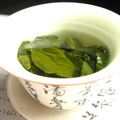
Quotes Tags: Green tea, Health, Tea oxidation
„Green tea is made from the leaves from Camellia sinensis that have undergone minimal oxidation during processing.“

Quotes Tags: Green tea, Tea oxidation, Tea production
Teas
2012 Autumn Fujian Anxi Benshan 100g
 2 reviews
2 reviewsOne of famous oolong teas from Anxi is Benshan. This is a light roasted with low oxidation (only 10-15%)...
Kabusé Okuyutaka 2012
 2 reviews
2 reviewsPacking: vacuum, 50 grams, packaged in Japan Tea is an original packaged in Japan and stored at low...
2011 "Zi Qi Dong Lai" Ripe Puerh Cake 150g
 1 review
1 review"Zi Qi Dong Lai" : The Purple Air coming from the east -- a propitious omen (from the East) is approaching...
Theme
Tea by region
We will help you with tea selection.
Do you like quality loose tea?
We will help you to find the right one for you. Be inspired by tea ratings of other tea lovers. Rating stars could help you.


Review your cup of tea.
Review the tea you are drinking and help other tea lovers to find the right cup of tea.



Quotes
„Pu'er traditionally begins as a raw product known as "rough" Mao Cha (毛茶) and can be sold in this form or pressed into a number of shapes and sold as "raw" Sheng Cha (生茶). Both of these forms then undergo the complex process of gradual fermentation and maturation with time.“



 Shops
Shops Share on Facebook
Share on Facebook







